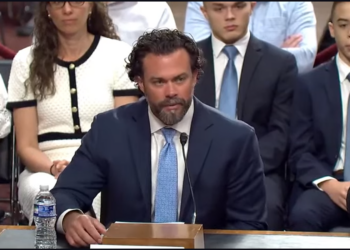Divorce is a terrible event in the lives of those it affects, particularly if there are children involved.
That is not to say that all parents who get divorced are villains. They are not. There are plenty who have to make the hard choice to end a marriage in order to protect their children or to get away from an abusive spouse.
“The decision to stay married must be made by both parties in the marriage,” Breakpoint President John Stonestreet and Senior Writer Shane Morris observe. “So, in many situations, a mom or dad finds herself or himself divorced against their will. Still, the normalization of divorce was driven by the oft-repeated myth that ‘the kids will be fine,’ that kids need ‘happy’ parents more than they need married ones.”
Divorce is a particularly sad example of the fallenness of our world. It is not what God intended. Nevertheless, almost all of us know someone — or we are someone — who has experienced divorce either as a spouse or as a child. In fact, it is estimated that nearly one-third of all American children are victims of parental divorce.
As a society, divorce has become more and more prevalent. Historically, one can point to two main drivers — The Great Society and the advent of no-fault divorce. First, President Lyndon B. Johnson’s horrible idea of paying single mothers incentivized single-parent households. It especially devastated the black community, which today has a fatherless rate of 70%. Second, no-fault divorce — or the dissolving of a marriage without having to prove wrongdoing of either spouse — opened up the floodgates.
Divorce has long-lasting and deep consequences for children. Last month, a study was published by the National Bureau of Economic Research; it tracked over five million children using tax and census records over the course of 50 years, and it found tremendously negative outcomes for children of divorce.
The first type of impact is economic. Children experience numerous changes in the wake of divorce. They may have to relocate to a new house and/or a less desirable neighborhood. Moreover, many parents suddenly have to live on a single-income budget. The earlier a divorce occurs in a child’s life, the less economically well off that child tends to be in adulthood. “Early childhood divorce reduces adult earnings by 9 to 13 percent,” according to the study, which goes on to explain that this loss of income is equivalent to losing a year of education or coming from a low-income neighborhood.
The second impact is the change in social environment. As mentioned above, children post-divorce often experience a change in housing and community. That move is often to a less affluent and less desirable neighborhood. This change in social influences increases risky behavior, which has two terrible effects. One, it elevates the risk of a child getting incarcerated by 40%. Two, a child has a 45% greater risk of premature death.
The third and final impact is the loss of relationship with one or both parents. According to the study, parents who get divorced live on average 100 miles away from one another. That lack of proximity leads to a lack of relationship. On the other hand, the parent that a child does get to see more often usually has to either return to work or put in longer hours; as a result, that parent is less able to be present. Aside from the aforementioned other increases in risky behaviors, this lessened parental involvement increases by 60% the odds that children of divorce will experience teen pregnancy.
These findings are definitive and put to rest the notion that divorce is a net positive for children. It’s not. That being said, there are plenty of divorced parents who have raised fine men and women who have overcome the trauma of surviving divorce. Conversely, there are plenty of stable married couples whose children have gone off the rails. This statistical analysis isn’t an oracle of your children’s future. It doesn’t mean you’re a bad parent and have doomed your children to a less optimal life.
However, it should give us pause as a culture. If divorce is demonstrably bad for children, shouldn’t there be more legal guardrails in place (i.e., getting rid of no-fault divorce)? Marriage should be valued more and held as the standard, not demeaned as just one of many options that could work for some families. There also needs to be a stronger community of people around these broken families, particularly in cases where a divorce occurs, to protect the safety of the children and the abused parent.
Divorce is a terrible event. It should not be entered into lightly.
















